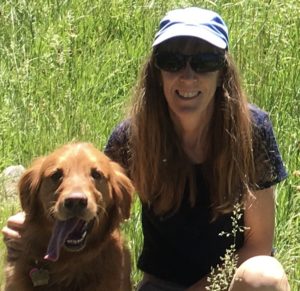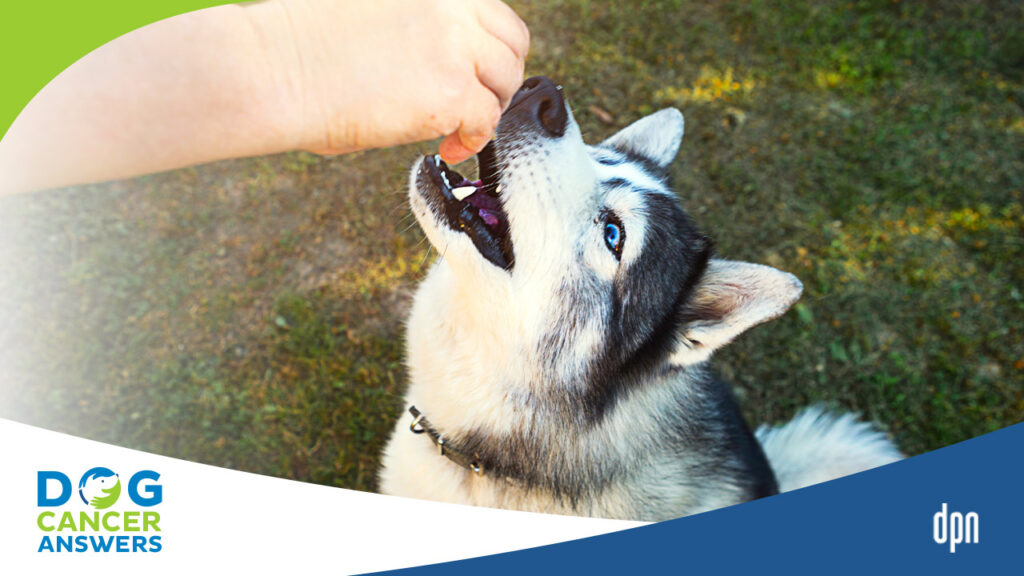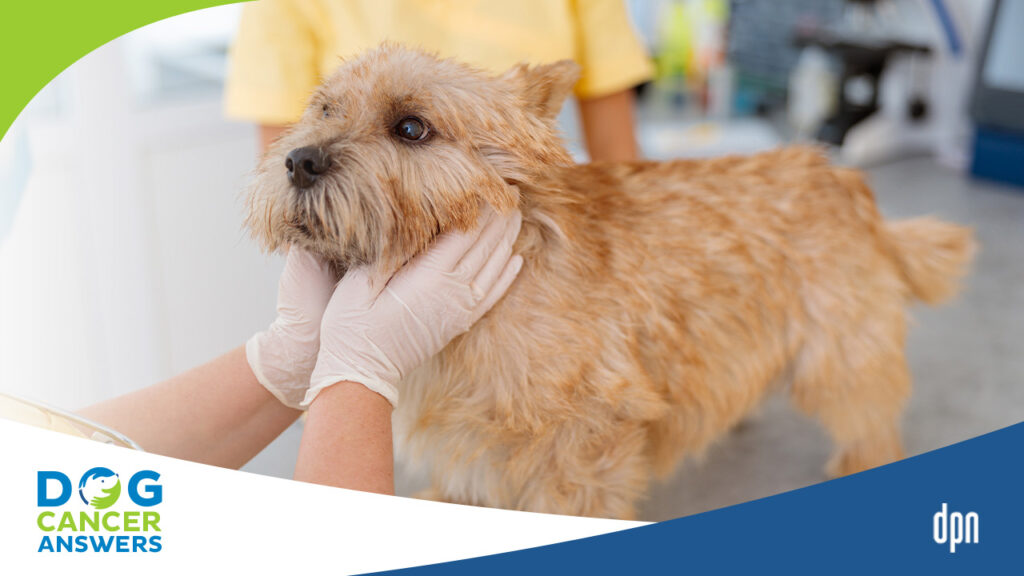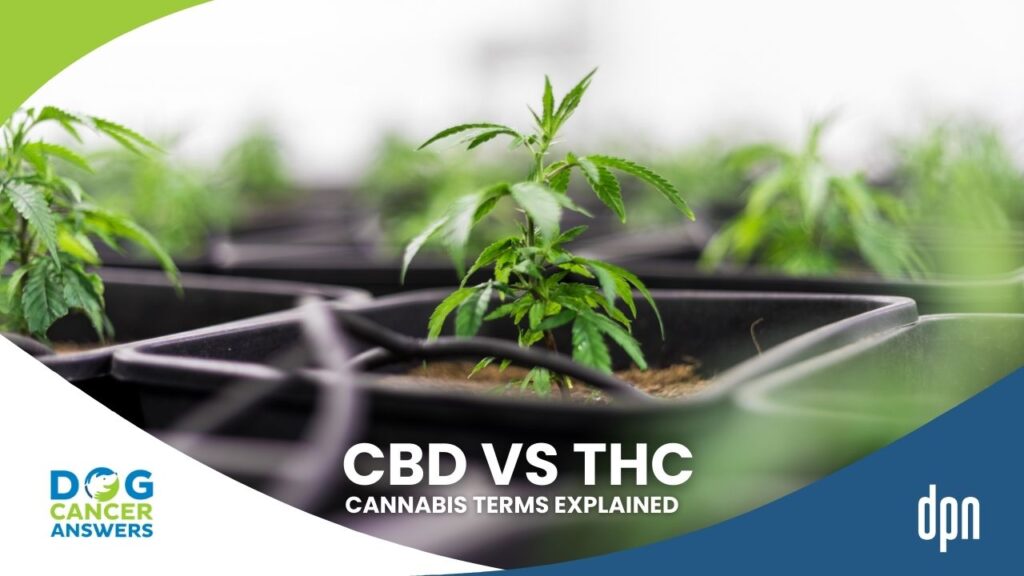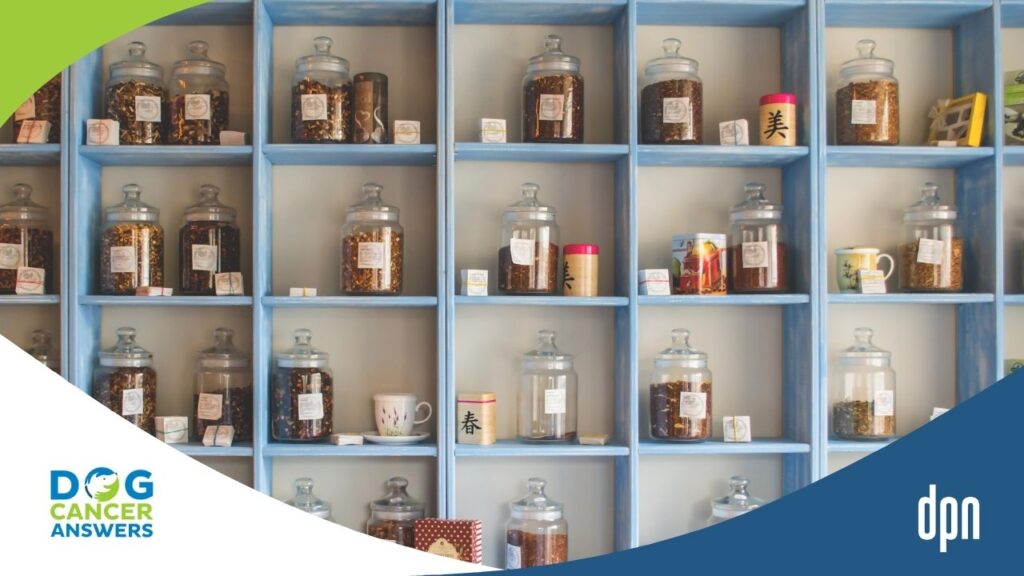EPISODE 158 | RELEASED March 14, 2022
Vitamin E for Dog Cancer: Can I Give It During Chemo? | Dr. Nancy Reese Q&A
Is it okay to give your dog vitamin E during chemotherapy, or will it make the chemo not work? Dr. Nancy Reese explains.
SHOW NOTES
Caller Bevan has a dog with mast cell tumors, and his vet recommended giving vitamin E as part of their treatment plan. Vitamin E is an antioxidant, which protects cells from damage. Chemotherapy is a pro-oxidant, with the intent to damage cells – specifically, cancer cells. Dr. Nancy Reese explains how these conflicting mechanisms of action can be problematic in some cases, but coexist peacefully in other, as well as why your vet might recommend giving vitamin E in the first place.
[00:00:00] >> Dr. Nancy Reese: We use antioxidants to try to protect cells from damage. And yet what we’re trying to do with chemotherapy and radiation is to damage cells. So it does seem sort of counter-intuitive to use both together.
[00:00:20] >> Announcer: Welcome to Dog Cancer Answers, where we help you help your dog with cancer. Here’s your host, James Jacobson.
[00:00:28] >> James Jacobson: Hello friend, and welcome to Dog Cancer Answers.
One of the more confusing pieces of navigating cancer treatment is the relationship between antioxidants and pro-oxidants. They sound the same, but they are different. And today we are going to dive into that topic and discuss how you can navigate it with the help of our medical editor, Dr. Nancy Reese.
She is a DVM, a PhD, an experienced veterinarian who also has a PhD in Epidemiology. Dr. Nancy, thanks again so much for being with us today.
[00:01:06] >> Dr. Nancy Reese: Oh, thanks for having me back.
[00:01:07] >> James Jacobson: Today we are reaching back into our mailbag, or our audio mailbag, people who’ve called the dog cancer hotline, and we’re taking a call from Bevan in Albuquerque who has a question about using vitamin E and chemotherapy, and would antioxidants conflict with chemotherapy? Let’s listen.
[00:01:31] >> Bevan: Thank you for doing this. My name is Bevan, I’m calling from Albuquerque, New Mexico. Vitamin E, which has been advocated by our vets for our dog with mast cell cancer – I wonder if that’s an issue because it is indeed an anti-oxidant. The one consistent is that the tumors keep coming back.
And she has always had vitamin E, turkey tail mushroom supplements, and a fair amount of cruciferous vegetables, such as broccoli and Brussels sprouts spread out during the week. Those also contain anti-oxidants. And I just wondered if you have any evidence that they work against the chemo like I’ve been told, or if it’s just very concentrated antioxidants, such as bromelain capsules, things like that, that are not a good idea. I’m just particularly puzzled by the vet’s advocacy of vitamin E because that’s a particularly strong antioxidant as far as I know. Thank you so much.
[00:02:36] >> James Jacobson: So, Dr. Nancy, the question of using antioxidants along with chemotherapy is an interesting one because they kind of conflict, right?
[00:02:48] >> Dr. Nancy Reese: That is the big concern, is that antioxidants are, or we use them, to try to protect cells from damage. And yet what we’re trying to do with chemotherapy and radiation is to damage cells. Um, so it does seem sort of counter-intuitive to use both together. One of the interesting things is that, well cancer cells and normal cells do behave differently, and our goal with chemotherapy or radiation is to target the cancer cells, but try to spare the normal cells. So on the one hand, doing antioxidants to try to help protect normal cells is a good idea. On the other hand, we don’t want to decrease the effect of the chemotherapy and the radiation by protecting cancer cells.
And in the past it was more, I mean, first day anti-oxidants were good, then they were bad. Now they’re back to good and bad. Um, so you know, you first, it was, you know, they’re perfectly healthy for all sorts of things. And then oncologists and things started worrying that it was going to interfere with the effects of the chemo.
Some of the more recent studies seem to show that it doesn’t necessarily interfere with the chemo and radiation. And the caller pointed out, some of that probably is a relationship to the dosages of the antioxidants and the particular chemotherapy and what sort of damage that it’s trying to achieve through the cancer cells.
[00:04:18] >> James Jacobson: Because when you have a lot, I mean, I know this in the case of the supplement Apocaps, when you have a lot of antioxidants, they become pro-oxidant, right? It’s a quantity.
[00:04:28] >> Dr. Nancy Reese: Yeah. So you definitely can, you can give so much that you start causing that pro-oxidant effect. So absolutely dosage has an effect. Um, and I think the caller had mentioned the antioxidants in food and that’s something that would not be a huge concern because the amount that’s in food, and you’re not getting this massively concentrated dose, like you might in some sort of capsule type of version.
So I think the antioxidants foods are a great thing. And that’s been shown, at least in people, to help with cancer treatments and, and preventing cancer and things. So a lot of times it is that, that dosage form. So I’d also say if you are working with an oncologist, get their personal opinion, because some of them are very pro antioxidants at reasonable dosages, and other ones are going to say, You know, if you do that, don’t come here, type of thing.
I mean, they, they might be more strict about it. I don’t think they’d be that severe, but you definitely want to let them know if you’re giving something that in their experience has interfered with the treatment, then you want to really have a good discussion about that.
[00:05:31] >> James Jacobson: And what about some of the vitamins that he was wondering about?
[00:05:34] >> Dr. Nancy Reese: Yeah, so he particularly mentioned vitamin E, and vitamin E does have some inhibitory effect on histamine release and mast cell tumors are full of histamine. I mean, that’s one of the ways they cause such symptoms like a lot of redness and bleeding and swelling and things that, that mast cell tumors can do, it’s because mast cells are full of histamine.
So vitamin E does seem to help inhibit histamine release from mast cells. So that’s, that’s a good thing. It might help protect against some of the secondary effects of the mast cells, but it doesn’t necessarily have a direct effect on the tumor. So I think he mentioned the tumors keep coming back, and that’s – vitamin E isn’t necessarily a treatment for the tumor, it’s a treatment for one of the secondary effects from the tumor related to that histamine. So it, the vitamin E is good to help protect blood vessel walls from, uh, excessive histamine, and things like that. So it’s a great support, but not necessarily a direct mast cell treatment.
[00:06:36] >> James Jacobson: Interesting. Well Bevan was indicating that clearly he’s working with an oncologist, and you mentioned sometimes oncologists don’t agree on things like antioxidants and pro-oxidants. Let’s talk about that when we come back. ‘Cause I think, you think, well, um an oncologist should have a definitive view, but that’s not always the case. And when we come back, we’ll talk about what you can do if that’s what you’re experiencing with your vet. We’ll be right back.
Dr. Nancy, you were saying that not all oncologists see eye to eye when it comes to the use of antioxidants along with chemotherapy.
[00:07:15] >> Dr. Nancy Reese: Yeah. So I think, again, the studies have been somewhat variable and I – this is one of those cases where if you have a particular belief in mind, and I do it just as much as anybody else does, but if you have a particular thought, I can go out and find research that will support directly opposite views.
[00:07:35] >> James Jacobson: Confirmation bias.
[00:07:36] >> Dr. Nancy Reese: Absolutely. That’s a great word, and it’s so true, but I think particularly in the antioxidant and chemotherapy range, that’s huge, because you will find things supporting both sides very equally. So I think that’s the place where you wanna talk to your oncologist and mention that you’re interested in using this, but getting their feel for what kind of dosage might interfere with the chemotherapy versus what would be kind of a general antioxidant support.
Because again, as the caller mentioned with foods, we’re all taking in pro-oxidants and antioxidants as part of our diet and yet we don’t ever think, oh that means the chemotherapy is going to not work and things. So there are ways to do it without taking super high quantities of any particular vitamin, because I think that has more potential to destruct a treatment that you’re trying to do, than if you take suggested doses, or it might be a matter of timing that, you know, on right after, or right before the radiation treatment, if you’re going to have that, you lay off on the antioxidants and only use them after it’s done a little bit of the killing, and then you’re going back to supporting or trying to prevent side effects.
So I think there’s uh timing, dosage, and what particular antioxidant you’re talking about, that is really good to talk to your oncologist about because there are ways to do it safely and there are ways that are going to diminish the treatment.
[00:08:58] >> James Jacobson: And if your oncologist does – you know, you’re consulting other veterinarians, you’re going online, you’re getting information that conflicts with what your oncologist believes or knows to be true – how do you have that conversation? Because I think that’s a difficult one.
[00:09:13] >> Dr. Nancy Reese: It is a difficult one because, and honestly, none of us like to be, confronted, I guess is the word, about somebody challenging what you think. You know, our first instinct is, this is my experience, and, you know, I hope that most people are a little open-minded to looking at some literature. So if you have, if you are working with multiple veterinarians and one is pro antioxidant, the others are anti, and you really feel strongly you want to use the antioxidants, talk to the pro antioxidant vet and say, Hey, can you point out some good research that I can bring to my oncologist?
Because unfortunately, yes, you can find all sorts of things on the internet, but that doesn’t mean it’s good research. So if you can find some good stuff that supports that position, I think most oncologists would be open to discussing it.
[00:10:01] >> James Jacobson: Awesome. Dr. Nancy, any final thoughts for Bevan?
[00:10:04] >> Dr. Nancy Reese: I guess the other one is, and I don’t know if this is realistic for him, but that, the newer treatment Stelfonta for the mast cell tumors. You know, if these tumors keep coming back, there’s two kinds of things: mast cell tumors, if they’re aggressive, they can metastasize, and the Stelfonta is not a good option, but if it’s, some breeds are just more prone to getting multiple mast cell tumors that are not necessarily spreading, and so the Stelfonta is a nonsurgical treatment that can help.
It makes a horrible wound, but it’s something that can get rid of the tumors pretty darn effectively.
[00:10:38] >> James Jacobson: Awesome advice. Dr. Nancy Reese, as always, thank you so much for being with us today.
[00:10:43] >> Dr. Nancy Reese: Thanks again.
[00:10:46] >> James Jacobson: And thank you, listener. If you, like Bevan, have a question about dog cancer, well then give us a call on our Listener Line.
It’s available 24 hours a day, seven days a week, and you can leave a message to be answered in a future episode of Dog Cancer Answers. The telephone number to do that at is (808) 868-3200. That is in the United States. If you are calling from overseas, that’s (808) 868-3200. That phone number again is (808) 868-3200.
If you have a dog with cancer and you are looking for some support, we invite you to join us on our Facebook group. It’s called Dog Cancer Support, and it is a vibrant community of dog lovers who are going through the same thing that you are. You can find that Dog Cancer Support group at the website, DogCancerSupport.com.
It redirects straight to the place on Facebook where you can become a member. And of course, membership is free. And speaking of free, you can also sign up for our newsletter. That is called Dog Cancer News, and the place to sign up for that is, you guessed it, DogCancerNews.com. It comes out three times a week and it has lots of helpful information on dog cancer treatments and strategies, and you can always unsubscribe at any point. But I hope you will subscribe today for free at DogCancerNews.com. Well, that is it for today. I am James Jacobson, and from all of us here at Dog Podcast Network, I’d like to wish you and your dog a very warm, Aloha.
[00:12:31] >> Announcer: Thank you for listening to Dog Cancer Answers. If you’d like to connect, please visit our website at DogCancerAnswers.com or call our Listener Line at (808) 868-3200. And here’s a friendly reminder that you probably already know: this podcast is provided for informational and educational purposes only.
It’s not meant to take the place of the advice you receive from your dog’s veterinarian. Only veterinarians who examine your dog can give you veterinary advice or diagnose your dog’s medical condition. Your reliance on the information you hear on this podcast is solely at your own risk. If your dog has a specific health problem, contact your veterinarian.
Also, please keep in mind that veterinary information can change rapidly. Therefore, some information may be out of date. Dog Cancer Answers is a presentation of Maui Media in association with Dog Podcast Network.
Hosted By
SUBSCRIBE ON YOUR FAVORITE PLATFORM
Topics
Editor's Picks
CATEGORY
